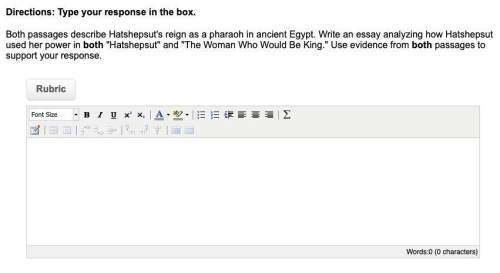
English, 04.12.2019 18:31 allison9746
Hatshepsut is considered the first major female ruler in history. she ruled egypt for over 20 years during the fifteenth century bce, becoming the longest reigning female pharaoh. today, she is still considered one of the most successful egyptian leaders.
hatshepsut was born into a royal family. she was the daughter of the pharaoh thutmose i and wife to another pharaoh, thutmose ii. when her husband died, his son was too young to rule, so hatshepsut was appointed regent, or someone who makes decisions for future rulers until they are old enough. after about seven years, however, hatshepsut proclaimed herself pharaoh.
in the past, historians believed that her declaration of power came from an ambition for power and control. more recently, evidence suggests that her decision may have been made in the midst of political crisis and meant to protect the throne for her stepson.
either way, egypt thrived under hatshepsut's reign. as pharaoh, her main interest was economic prosperity. this set her apart from rulers before and after her, whose priority was gaining control over new territory. she began a huge program to renovate temples and monuments and build new ones, including a magnificent funerary temple for herself. her building projects also allowed her to create monuments in which she depicted herself with a false beard, a detail only allowed on the portraits of a pharaoh. probably as a way to assert her power, hatshepsut also showed herself with a male body in the king's traditional clothing and crown.
when thutmose iii was old enough to rule, he quickly assumed control of the army. perhaps because she feared an uprising, hatshepsut dispatched the army on an expedition to the land of punt, which is believed to have been somewhere on the northeast coast of africa. previous pharaohs had also sent expeditions to punt. hatshepsut's expedition succeeded in bringing back rare myrrh trees, gold, and ivory, among other treasures. this expansion of egyptian trade is thought of as one of the greatest achievements of her reign.
hatshepsut died around 1458 bce and thutmose iii became pharaoh. later in his rule, he had all the images of his stepmother removed from the buildings and temples she had built. perhaps he wanted to stomp out her example of such a powerful and effective ruler from the people's memory and from egypt's history. if this is true, his plan succeeded until 1822, when a group of scholars came across hatshepsut's story in the ancient writing on a temple's walls. fortunately, hatshepsut and her prosperous reign have now been firmly carved back into egypt's history.


Answers: 2


Another question on English

English, 22.06.2019 04:30
What is wrong with they follow citation of a book with two authors
Answers: 1

English, 22.06.2019 07:30
What is the purpose of the scene in leo tolstoy’s the death of ivan ilyich in which ivan ilyich thinks about the following logical argument, known as a syllogism?
Answers: 1

English, 22.06.2019 07:50
Hurry i am on the semester test which theme is evident in this excerpt from robert frost's "mending wall"? but at spring mending-time we find them there. i let my neighbor know beyond the hill; and on a day we meet to walk the line and set the wall between us once again. we keep the wall between us as we go. to each the boulders that have fallen to each. and some are loaves and some so nearly balls we have to use a spell to make them balance: "stay where you are until our backs are turned! " we wear our fingers rough with handling them. oh, just another kind of out-door game, one on a side. it comes to little more: there where it is we do not need the wall: he is all pine and i am apple orchard. my apple trees will never get across and eat the cones under his pines, i tell him. he only says, “good fences make good neighbors." spring is the mischief in me, and i wonder if i could put a notion in his head: "why do they make good neighbors? isn't it where there are cows? but here there are no cows. before i built a wall i'd ask to know what i was walling in or walling out, and to whom i was like to give offence. . " a. the human desire for material gain b. the influence of financial constraints c. the positive effects of friendship d. the uncertain nature of human relations e. the futility of human yearning
Answers: 1

English, 22.06.2019 08:00
Identify the homophone pair that needs to be corrected in these sentence
Answers: 1
You know the right answer?
Hatshepsut is considered the first major female ruler in history. she ruled egypt for over 20 years...
Questions

History, 23.03.2020 06:59



English, 23.03.2020 07:00

Mathematics, 23.03.2020 07:00

Mathematics, 23.03.2020 07:00


Mathematics, 23.03.2020 07:00

Mathematics, 23.03.2020 07:00


Mathematics, 23.03.2020 07:00

Physics, 23.03.2020 07:00


Mathematics, 23.03.2020 07:00



Mathematics, 23.03.2020 07:01

History, 23.03.2020 07:01

English, 23.03.2020 07:01



